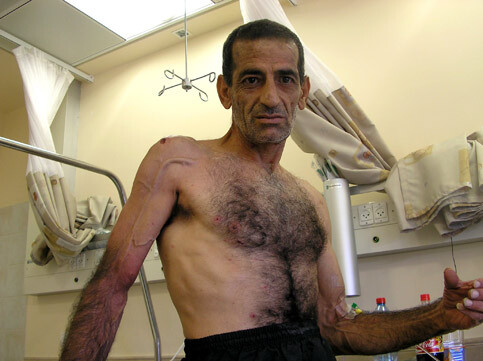IRIN 11 October 2006

An Arab-Israeli suffers from shrapnel wounds following Hezbollah attacks in Haifa (Tom Spender/IRIN)
TEL AVIV - Business owners from four Arab villages in the north of Israel are waiting to see whether a court will grant them the same compensation as their Jewish Israeli counterparts for damage done during the recent war between Israel and the armed wing of Lebanon’s political party Hezbollah.
Arab organisations in Israel say the Israeli-Hezbollah conflict [12 July to 14 August] may have hit Arab communities harder because they were generally poor to start with.
The villages of Arab al-Aramshe, Fasuta, Ma’alia and Jesh, suffered serious damage during the conflict, but have been denied the full compensation package awarded to neighbouring Jewish villages.
“I feel very bad about this. I lost about 215,000 shekels [about US $50,580] because I had to shut down the business during the war. Now it’s almost impossible to carry on,” said optician Abeer Shehada, a middle aged Arab-Israeli.
“I live in Jesh, just a few kilometres from Lebanon. If I lived in a Jewish village so close to the border, I would get the full compensation but because I live in Jesh I do not,” added Shehada, whose house was hit by a missile, as well as his business.
There are more than one million Arab-Israelis in Israel, making up about 20 percent of the population. About 600,000 of them live in the north of Israel, which suffered heavy damage from the 3,970 rockets fired by Hezbollah during the conflict.
The Arab-Israeli minority rights group Adalah has submitted a legal claim on behalf of the four Arab villages, demanding the government change its stand on giving them only partial, not full, compensation.
“The Hezbollah missiles didn’t distinguish between Arabs and Jews, so there’s no reason for the compensation to do so,” said Adalah lawyer, Sawsan Zaher.
“There are no bomb shelters at all in Arab towns in the north of Israel - not even in Nazareth [which has a total population of 60,000],” said Dr Basil Ghattas, director general of the Galilee Society, which pushes for equal health, environmental and socio-economic rights for Arab-Israelis.
According to the Federation of Israeli Chambers of Commerce, businesses in the north of Israel lost revenues of 5.9 billion Israeli shekels (US $ 1.4 billion) as a result of the war.
Ghattas said the war “had a huge impact on Arab communities in the north because they were already more vulnerable. They have high unemployment rates and are always the first to be fired if business is affected by conflict - as happened this time.”
“Many small Arab businesses were severely damaged by the fact that the whole region was under continuous attack, for example restaurants that were popular with tourists,” he said.
Israel’s system for paying compensation after the conflict with Lebanon’s Hezbollah is complex.
In the 1970s, Israeli towns near the Lebanese border were given the status of border towns. This entitled companies in the towns to full compensation if a war disrupted or damaged their business, including physical damage and cancelled contracts, as well as costs such as tax or rent.
On 31 July, the Israeli government drafted a new border town list to take in all areas hit by Hezbollah rockets, including cities such as Haifa and Nazareth. But businesses in towns in the new list are entitled only to partial compensation, based on whether or not their employees continued working during the war.
Adalah is arguing that the same compensation regime should exist for all businesses in the north of Israel because the distribution of missile attacks was evenly spread.
The matter is now before the Israeli Supreme Court with the Israeli government due to present its case on 30 October.
Yariv Ovadin, spokesman for the Israeli Ministry of Foreign Affairs, said the decision over compensation was now down to the court.
“It will be up to the judges to decide. We have a very well-established system that is very helpful to minorities,” he said.
Ovadin added that Israel did not discriminate against its Arab minority.
“I absolutely reject allegations of racism,” he said.
“The conflict with Hezbollah was the first time we faced a bombardment of Arab towns. Nobody ever thought something like this would happen. It was surprising to see Arab citizens being bombarded by an Arab enemy and it never happened before.
“I’m sure the situation regarding bomb shelters in Arab areas will be changed. There may have been a miscalculation by the government but it was not done on a racist basis,” Ovadin said.
He added that “The whole system of bomb shelters was ignored. In Jewish towns like Kiryat Shmona, there was no work done on bomb shelters in the last 15 years - we thought the days of missiles were behind us.”
This item comes to you via IRIN, a UN humanitarian news and information service, but may not necessarily reflect the views of the United Nations or its agencies. All IRIN material may be reposted or reprinted free-of-charge; refer to the copyright page for conditions of use. IRIN is a project of the UN Office for the Coordination of Humanitarian Affairs.
Related Links